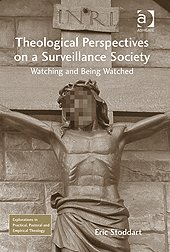Surveillance enables complex societies to function. Steps to remove CCTV or security scanners from transportation hubs would be politically disastrous. Were Facebook servers to fail for a day social life for many would grind to a halt. Anything other than 24/7 access to online retailers would seriously inconvenience eager shoppers. Criminal investigations would slow to a crawl were the police to rely on only paper records and local knowledge. We are beneficiaries, objects and practitioners of ubiquitous surveillance.
Theological critique of contemporary surveillance cultures might readily turn to traditional discourse around divine omniscience and God’s watching over creation. The project that I am unfolding adopts a quite different paradigm. It is Christ’s surveillance from the cross that frames my approach. One under surveillance keeps watch over the world, in solidarity with all those under others’ monitorial gaze for whom the outcomes are life-denying.
 I am contending that, whilst the technological devices by which surveillance is deployed are important points for theological reflection, there are underpinnings that are of even more pressing concern. Surveillance is predicated upon managing risk but advanced capitalist societies are unable to handle the contingency of God’s world. One part of the theological task is to demonstrate to the wider world how fragile are its conceptual foundations whilst offering a vision of non-naïve trust in God.
I am contending that, whilst the technological devices by which surveillance is deployed are important points for theological reflection, there are underpinnings that are of even more pressing concern. Surveillance is predicated upon managing risk but advanced capitalist societies are unable to handle the contingency of God’s world. One part of the theological task is to demonstrate to the wider world how fragile are its conceptual foundations whilst offering a vision of non-naïve trust in God.
Through the lens of a theological ethics of care, I deploy a hermeneutic that is constituted from feminist, liberationist, queer and postcolonial perspectives. What emerges is a critique of the culture of surveillance that is particularly attentive to disenfranchising and attempted normalization of identities. Theological tradition (within which I include the Bible) is approached with suspicion but as, in many respects, a recoverable source of imaginative envisioning for human flourishing by the Spirit of God in Christ.